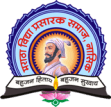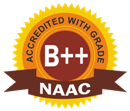- About the Department:
The department of statistics is the beating heart of data analysis, bringing numbers to life with exacting procedures and perceptive interpretation. It provides precise illumination of trends and patterns and is a fundamental cornerstone in decision-making in a variety of sectors, including economics and healthcare. We, analysts and mathematicians work together to solve the puzzles concealed in datasets, enabling decision-making that is well-informed and promotes innovation. In an increasingly complicated environment, the Statistics Department stands out for its fundamental role in contemporary research and industry.
- Year of Establishment: 1986
- Names of Programmes / Courses offered (UG, PG, M.Phil., Ph.D., Integrated Masters; Integrated Ph.D., etc.): F.Y.B.Sc. and S.Y.B.Sc.
- Names of Interdisciplinary courses and the departments/units involved: Y. B. Com.
- Number of teaching posts
| Post | Sanctioned | Filled |
| Assistant Professors | 01 | 01 |
- Faculty profile with name, qualification, designation, specialization:
| Name | Qualification | Designation | Specialization | Period |
| Dr. S.T. Wagh | M.Sc., Ph.D. | Head and Associate Professor | Statistics | 1986-2020 |
| Mr. Lokesh Pachlore | M.Sc. | Assistant Professor | Statistics | 2020-2023 |
| Mr. S.R. Chavan | M.Sc., NET, SET | Assistant Professor | Statistics | 2022-2023 |
| Dr. K.P. Amrutkar | M.Sc., Ph.D. | Head and Assistant Professor | Statistics | 2023-2024 |
| Dr. N.V. Khangar | M.Sc., Ph.D. | Head and Assistant Professor | Statistics | 2024 to till date |
- Qualifications of teaching faculty with DSc/ D.Litt/ Ph.D/ MPhil / PG.
| Qualifications of teaching faculty | |||
| Ph.D. | M. Phil. | PG with SLET/NET | PG |
| 01 | — | 01 | |
- Publications
| Name of the Faculty | Research Papers | Total Publication | Books | Edited Book | Total Citation | H Index | Impact Factor | ||
| International | National | Proceeding | |||||||
| Dr. K.P. Amrutkar | 10 | — | 01 | 11 | — | — | — | — | — |
| Dr. N.V. Khangar | 07 | — | 07 | — | — | — | — | — | |
- Faculty as members in a) National committees b) International Committees c) Editorial Boards:
| Name of the Faculty | National /International/ Other Committee / Editorial Board |
| Dr. N.V. Khangar |
1. Life Member of Indian Society for Probability and Statistics (ISPS) 2. Annual Member of International Indian Statistical Association (IISA) 3. Special Invited Member of Government of Maharashtra for effective implementation of the different Schemes in the Nashik District. |
| Dr. K.P. Amrutkar |
1. Life Member of Indian Society for Probability and Statistics (ISPS) 2. Member of International Multidisciplinary Research Foundation 3. B.O.S. Member in Statistics at M.J. College (Autonomus), Jalgaon |
- Details of Infrastructural facilities:
| a) Departmental Library | 01 (96 books) |
| b) Internet facilities for Staff & Students | Yes |
| c) Class rooms with ICT facility | 01 |
| d) Laboratories | 01 |
- Teaching methods adopted to improve student learning:
-
- Chalk and Talk (Lecture Method)
- ICT: Use of Power Point Presentations, Audio Lectures, Educational CD, Use of software.
- Guest Lectures by Experts
- Learning through experiments
- Seminars
- Classroom discussions
- Assignments
- Projects: Through projects students learn various techniques:
- Interaction with people
- Understanding social issues
- Participation in Institutional Social Responsibility (ISR) and Extension activities:
- SWOC analysis of the department and Future plans:
-
- Strengths
- Well-equipped laboratory.
- ICT enabled teaching learning facility.
- Being an interdisciplinary subject, department renders services to various departments.
- Weaknesses
- Laboratory is small.
- Statistics subjects is not taught at special under Graduate level
- Inadequate strength of the students.
- Opportunities
- To offer B.Sc. in Statistics.
- More scope for research work.
- Challenges
- To increase students’ strength and start T.Y. B.Sc. Statistics

